Rose Marino-Foster
Rose Marino Foster has been a Literacy Specialist working within the Elmont school district for over fifteen years. She holds a M.A. in Childhood Education and a M.S. in Literacy B-12. Her experience includes working as an AIS teacher, teacher mentor and now a district wide Instructional Coach. Rose was nominated for the Herald Head of the Class Award for the 2020-2021 school year for her dedication to her profession. She has a passion for not only educating students but for also guiding other educators to grow their instructional capacity and skill. Rose has been teaching courses for LIIPS for over a decade.
Check out my course offerings:
Courses |
|---|
 Developing Fun, Interactive, & Effective SMARTBoard Lessons Developing Fun, Interactive, & Effective SMARTBoard Lessons*Requirement: access to SMARTBoard/and or SMART Notebook Software
Course Description: Teaching and learning has combined with the technology of the 21st century through the use of the SMARTBoard in many classrooms across the country. This interactive electronic whiteboard works with your computer to create a highly motivating teaching tool with endless possibilities. SMART software enables teachers to create dynamic, content rich lessons that foster the various learning modalities of our students, especially visual and kinesthetic.
The first portion of this course will provide an overview or review of the usage of a SMARTBoard via informational PDF files for download as well as tutorial video clips. The main focus of the course will be to allow teachers the opportunity to research the internet to explore the countless resources available to educators with regards to SMARTBoard use. Participants will learn new and exciting ways to enhance their instruction through the use of this technology. In addition, educators will be exposed to pre-made, ready-to-go material for immediate adaptation and use in their classroom. Furthermore, participants will be given the opportunity to create their own lessons for the SMARTBoard using the resources provided. Whether you are a novice or an expert on the use of the SMARTBoard, this course will expose you to a vast variety of resources to fit all grade levels and content areas.
ON-LINE (3 credits/45 hours) in-service credit only $250.00$280.00 Buy here |
 Effective Vocabulary Instruction Effective Vocabulary InstructionWith the adoption of the new Common Core Standards, a greater emphasis is being placed on nonfiction and vocabulary instruction. This course will explore the philosophy behind vocabulary instruction as well effective practices. Participants will research dozens of strategies for building vocabulary aligned to meet various learning styles. In addition, this course will explore vocabulary resources including multimedia, interactive websites, educational vocabulary learning games and much more! Participants will have the opportunity to research and evaluate effective vocabulary lessons as well as create dynamic lessons for immediate classroom use. A must for all educators K-12!
ON-LINE (3 credits/45 hours) in-service credit only $250.00$280.00 Buy here |
 Guided Reading – Making it Work in Your Classroom Guided Reading – Making it Work in Your Classroom“Guided reading is a teaching approach used with all readers, struggling or independent, that has three fundamental purposes: to meet the varying instructional needs of all the students in the classroom, enabling them to greatly expand their reading powers; to teach students to read increasingly difficult texts with understanding and fluency; to construct meaning while using problem solving strategies to figure out unfamiliar words that deal with complex sentence structures, and understand concepts or ideas not previously encountered. Guided reading is the place where every child, every day, has the opportunity to learn by reading a book that is just right.”
– Fountas & Pinnell, 2001
This course will provide a detailed explanation of the philosophy of guided reading. Various components of guided reading will be explored including: management, teacher and student roles, assessment, flexible grouping, strategy and skill lessons, etc. Participants in the course will research the history of small group instruction and compare/contrast guided reading with more traditional instructional approaches. In addition, participants will learn the benefits of guided reading and be given the resources and information to implement guided reading within his/her own classroom.
ON-LINE (3 credits/45 hours) in-service credit only $250.00$280.00 Buy here |
 Improving Adolescent Literacy Skills Improving Adolescent Literacy SkillsAccording to recent reports from the National Council of Teachers of English, approximately half of high school graduates lack the reading skills needed to pass first-year college courses, and only 59 percent of the students tested were considered ready for college level work. Equally alarming, the National Assessment of Educational Progress reported that 70 percent of middle and high school students score below the proficiency level in reading achievement. The lack of improvement in literacy achievement has many negative implications for the nation’s economy and ability to compete globally. To be competitive in the current job market, American youth have to possess far more advanced literacy skills than those required of any previous generation.
The first portion of this course will examine the recent studies and statistics of current trends regarding adolescent literacy. Participants will research federal policy for improving the performance of adolescents. The second part of this class will focus on reading interventions for adolescent learners. Participants will study the philosophy, implementation, and effectiveness of various reading intervention programs including: Reciprocal Teaching, Strategic Instruction Model, Accelerated Reader, Corrective Reading , Fast ForWord, Read 180, etc. In addition, this course will provide numerous reading strategies and interventions to use with adolescent students before, during, and after reading. Some of the strategies/interventions featured in this course include: anticipation guides, the Frayer Model, Directed Reading Thinking Activity (DRTA), Selective Highlighting, Survey-Question-Read-Recite-Review (SQ3R), Exit Slips, Question-Answer Relationship (QAR) and many more! With the resources and information provided in this course, teachers will be able to create dynamic lessons which help foster student success.
ON-LINE (3 credits/45 hours) in-service credit only $250.00$280.00 Buy here |
 Literature Circles to Enhance Reading Comprehension Literature Circles to Enhance Reading ComprehensionA Literature circle, sometimes referred to as a book club, is a type of reading instruction that is commonly found within a balanced literacy program. The main goal of literature circles is to enable children to develop a thorough understanding of a text. Reading comprehension is deepened through the completion of individualized tasks, combined with small group discussions. This form of reading instruction involves student choice, which fosters a student-centered love of literature. Through the use of literature circles, students are given the opportunity to purposefully respond to a text, make connections from their background knowledge, engage in critical responses to make meaning from the text, and much, much more!
Course participants will research the philosophy behind literature circles, as well as the methods, roles, and procedures of literature circles. Through this research, participants will learn how to implement this form of reading instruction within his/her own classroom. This course will provide information on the ways in which to differentiate literature circles, in order to the meet the needs of both advanced and struggling readers. In addition, this course will provide resources for teachers to further explore literature circles including: bibliographies of suggested literature, role worksheets, lessons plans, and much more! Suitable all educators, K – 12.
ON-LINE (3 credits/45 hours) in-service credit only $250.00$280.00 Buy here |
 Poetry Instruction and the Next Generation Standards Poetry Instruction and the Next Generation StandardsApril is National Poetry month, but this genre is beneficial to study and teach all year long!
According to Fountas and Pinnell, “When you immerse your students in rich, lively poetry, you introduce them to intense, concise, skillfully crafted language.” Poetry instruction helps to build fluency skills as well as creates an opportunity for students to think critically, make inferences, and draw conclusions. With regards to high stakes testing, poetry is a genre found on NYS ELA exams each year across the grade levels. Poetry is also incorporated within the Next Generation Standards and therefore it is necessary for educators to teach this genre.
The first part of this course will explore the genre of poetry and the benefits for using poetry within the classroom. Participants will research the vast array of poetry forms available to use with his/her students. The course will provide resources to assist educators with poem selection and expose participants to a variety of poetry websites.
The second part of this course will focus around poetry with regards to the Next Generation Standards. Participants will research the expectations of the Next Generation Standards appropriate to his/her grade level. In addition, participants will view and evaluate multimedia resources as well as actual poetry lessons appropriate to his/her grade level. Also, participants will explore poetry exemplars from the NYS Department of Education. As a culminating activity, participants will create dynamic poetry lessons aligned with the Next Generation Standards for immediate use in his/her classroom. Appropriate for all educators K-12!
ONLINE (3 Credits / 45 hours ) in-service only $250.00$280.00 Buy here |
 Social Media in Education Social Media in EducationWith the advent of social networking and social media platforms, billions of people are now connected and communicating all over the world. As educators, we are teaching students of the digital age, who utilize social media for all aspects of life. This course will examine the use of social media in schools and the impact social media has had on youth. Participants will debate the benefits as well as the risks associated with social media usage. Cyberbullying will be examined in this class, including prevention and response strategies for educators. In addition, this class will provide information on cyber safety education to help students become “CyberSmart.” During this class, participants will have the opportunity to research social media platforms such as twitter, facebook, Linkedin, and pinterest in order to enhance instruction and learning, improve parent-teacher communication, for professional development, and much more!
ONLINE COURSE (3credits/45hours) In-service credit only
$250.00$280.00 Buy here |
 Student Learning Objectives (SLOs): What Every Educator Needs to Know Student Learning Objectives (SLOs): What Every Educator Needs to KnowThe focus of this course will be to provide educators with an overview of the Student Learning Objective process or SLO. According to the NYS Department of Education, a Student Learning Objective is an academic goal for a teacher’s students that is set a the start of a course. SLOs are aligned to Common Core Standards and are used to measure student growth, as well as teacher effectiveness. In this course participants will research the purpose and benefits of the SLO process as well as the required components of SLOs. Participants will learn which educators are responsible for for writing SLOs and how these learning objectives factor into the teacher evaluation system (APPR). In addition, educators will have the opportunity to view and evaluate state provided model SLOs written by NYS educators, across all grade levels/content/specialty areas. Resources will be provided for educators to engage in a “how to” SLO writing process. As a culminating activity participants will write his/her own grade level/content area SLOs. This course will utilize a variety of resources such as videos, webinars, and articles from various websites including: htt:://engageny.org/. Appropriate for all educators K-12, especially specialty area teachers.
ON-LINE (3 credits/45 hours) in-service credit only $250.00$280.00 Buy here |
 Approaches to Positive Behavior in the Classroom Approaches to Positive Behavior in the ClassroomCourse Description: According to the most recent research on teacher effectiveness, instruction flourishes in a classroom environment that promotes a collaborative community. This course will provide an overview on the philosophy behind creating a classroom culture that fosters positive behavior. Participants will learn strategies for establishing classroom settings, routines, and expectations that encourage student voice, creativity, leadership, and effective teamwork. Educators will research strategies for constructive supervision, increasing student capacity and opportunity as well as methods for reducing negative behaviors. During this class, participants will explore technological resources to monitor and motivate student behavior. Educators will also learn how to write and use both a Functional Behavior Assessment (FBA) and a Behavioral Intervention Plan (BIP) based upon data collection. As a result of this class, participants will learn best practices to improve student behavior and create an ideal learning environment for success!
A must for all Educators K-12! $250.00$280.00 Buy here |
 Approaches to the Science of Reading Approaches to the Science of ReadingON-LINE (3 credits/45 hours) in-service credit only Instructor: Rose Marino Foster (rosemarino5@gmail.com) Course Description: The term “Science of Reading” refers to large a body of research spanning over five decades. This research draws from multidisciplinary fields including: cognitive psychology linguistics, neuroscience, education in order to understand how individuals learn to read. This course will provide an overview of the Science of Reading and its implications for effective literacy instruction. Through engaging assignments and informative resources, participates will explore key concepts such as: phonemic awareness, phonics, vocabulary development, fluency, assessment practices and comprehension strategies. Participants will also research effective practices for orthographic mapping of words as well as improving student fluency, vocabulary knowledge and reading comprehension. As a result of this class, participants will have the knowledge and tools to implement effective evidence-based reading instruction. $250.00$280.00 Buy here |
